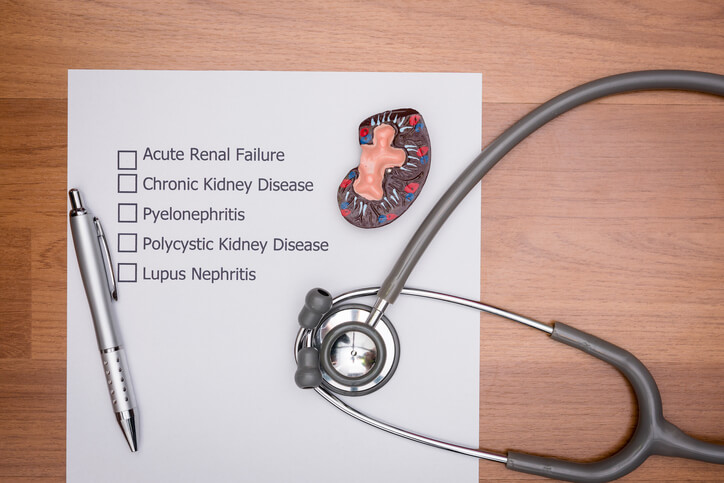Proton pump inhibitors (PPIs) are incredibly popular with physicians as well as patients all across the United States. As the third-highest-selling drug category, proton pump inhibitors currently drive $13.9 billion in sales every year. PPIs effectively treat severe heartburn or gastroesophageal reflux disease (GERD) symptoms. Unfortunately, recent studies also show long-term PPI use can be dangerous due to previously unknown side effects. Regular or extended PPI use can increase your risk for developing osteoporosis, dementia and Alzheimer’s later in life. Perhaps the biggest surprise with proton pump inhibitors is rapid-onset kidney disease. Sadly, many people believe PPIs are benign because they can buy them almost anywhere without needing a prescription.
Researchers now link proton pump inhibitors to “silent” kidney damage due to asymptomatic hypomagnesemia, or chronic magnesium depletion. While excess stomach acid causes heartburn, it’s also needed for proper nutrient absorption in the gastrointestinal tract. New studies show proton pump inhibitors more than double your acute kidney injury (AKI) and acute interstitial nephritis (AIN) risks.
Studies Link Proton Pump Inhibitors to Chronic Kidney Damage
A 2016 JAMA Journal of Internal Medicine study analyzed 10,482 chronic kidney disease (CKD) patients. Some took PPIs, while others did not. For almost 14 years, researchers looked for a correlation between kidney damage and proton pump inhibitors.
The investigators broadened their observations using data from 248,751 subjects in Pennsylvania’s Geisinger Health System. They followed this patient population for 6.2 years. Doctors prescribed proton pump inhibitors to 6.8% of the study’s participants. The study concluded that the 10-year estimated absolute risk for developing CKD while using proton pump inhibitors was 11.8%. Researchers noted that the risk appears exclusively to affect individuals taking proton pump inhibitors. Other GERD drugs, such as H2 blockers and antacids, didn’t measurably increase the risk for developing CKD.
New Study Shows Causal Link Between Proton Pump Inhibitors and Acute Kidney Injury
In April, a comprehensive meta-analysis of 2,404,236 participants looked for additional AKI risk factors for people taking proton pump inhibitors. Overall, PPI use produced a 61% higher adjusted AKI risk for all subjects. However, the study’s researchers found a 15% higher AKI risk with twice-daily dosing compared to once-daily doses. Another strong risk factor? “Our analysis revealed that younger patients might be more likely to develop AKI due to PPI use,” the study concluded. (In the study’s cohort, “younger patients” are participants under 60 years old.)
More recently, an August 2017 population-based cohort study observed 600,000 subjects. Researchers found subjects who started taking PPIs were more than twice as likely to be hospitalized for AKIs. Upon discharge, 59% of AKI patients were re-prescribed PPIs within 100 days. Among those re-prescribed PPIs, “7.5% were readmitted to hospital with AKI in the ensuing 120 days, consistent with a causal role of PPIs in some instances,” the study concluded.
OTC Heartburn Drugs vs. PPI Risks
The most common PPIs include Nexium, Prilosec, Prevacid and Zegerid. But an April 2016 study compared PPIs against their less-potent counterparts, H2 blockers, to assess their relative incident CKD risks. Zantac, Pepcid and Tagamet are all classified as H2 blockers, and they’re also widely available without needing a prescription. Over a five-year period, researchers tracked more than 173,000 patients listed in the Department of Veterans Affairs medical records database. They determined PPI users were more likely to develop CKD progressing to end-stage kidney failure than individuals taking H2 blockers or other heartburn remedies.
During the five-year study, doctors diagnosed CKD in 15% of PPI users. Compare that to 11% of participants diagnosed with CKD while taking H2 blockers, such as Zantac. After considering all possible confounding factors, researchers concluded that PPI users still had a 28% greater risk for CKD relative to any other heartburn drug. Significantly, the longer patients stayed on PPI therapy, the higher their risk for succumbing to end-stage kidney failure. Long-term PPI users showed nearly double the the risk of CKD progressing to renal failure – which is often fatal.
Physicians Call for Reevaluation of Prescription PPI Use
Johns Hopkins epidemiologist Dr. Benjamin Lazarus urged doctors to think twice before writing PPI prescriptions due to recent study findings. “More than 15 million Americans used prescription PPIs in 2013, costing more than $10 billion. Study findings suggest that up to 70% of these prescriptions are without indication and that 25% of long-term PPI users could discontinue therapy without developing symptoms. Indeed, there are already calls for the reduction of unnecessary use of PPIs.”
And University of California doctors Ada Jacob Schoenfeld and Deborah Grady urge doctors to recommend safer alternatives before prescribing PPIs. Alternative treatments with better patient safety outcomes include H2 blockers, antacids, or lifestyle changes (like cutting out caffeine and alcohol). Their op-ed piece states, “A large number of patients are taking PPIs for no clear reason — often remote symptoms of dyspepsia or ‘heartburn’ that have since resolved. In these patients, PPIs should be stopped to determine if symptomatic treatment is needed.”
How To Get The Justice You Deserve
Despite continued evidence that PPIs can cause kidney damage, many consumers hold drug manufacturers responsible for not disclosing these risks. As a result, individuals who developed life-threatening PPI complications are now suing the companies that make Prilosec, Nexium and Prevacid.
If you or a loved one suffered serious health complications from long-term PPI use, you may be eligible for compensation. Get your free, two-minute claim evaluation online today to see if you may qualify. Once you’ve submitted your form, an experienced attorney will call you to discuss your case and compensation options.
Related: Nexium Adverse Reactions: What You Need to Know
Mandy Voisin
Mandy Voisin is a freelance writer, blogger, and author of Girls of the Ocean and Star of Deliverance. As an accomplished content marketing consultant, mom of four and doctor's wife, Mandy has written hundreds of articles about dangerous drugs and medical devices, medical issues that impact disabled Americans, veterans' healthcare and workers' compensation issues since 2016.

